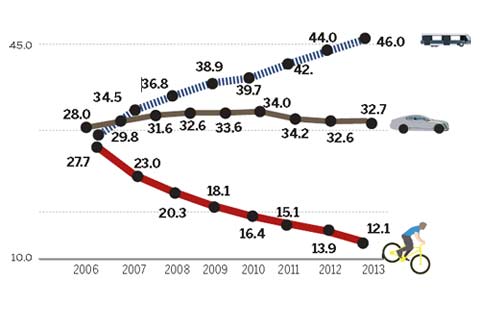China restricts content and number of overseas TV
Updated: 2014-09-11 07:38
By Han Bingbin(China Daily)
|
|||||||||||
 |
|
A scene from the popular American TV series 2 Broke Girls. Getty Images |
 |
| Online TV shows boom despite tighter control |
 |
| 24's return fuels hope for China's TV fans |
The State Administration of Press, Publication, Radio, Film and Television announced on Sept 5 that overseas movies and TV series that don't obtain a public screening and distribution license cannot be streamed on video websites.
Such sites are required to register details of their ongoing programs with the administration before March 31; starting on April 1 all unregistered shows should be removed.
The policy came after a series of progressive restriction policies regarding Internet-based programs.
In March, the administration required that online content be examined by at least three government-trained specialists. Programs should be removed immediately if they include inappropriate content, such as promoting superstition or glamorizing violence, sex or gambling.
In late April, it required four popular American TV series, including The Good Wife and The Big Bang Theory, to be removed from video websites without giving specific reasons.
In July, the administration called meetings with seven licensed Internet-television content providers, which provide online content to set-top boxes, to warn of a possible license withdrawal because all have acted against rules in varying degrees. As a result, many US programs are now missing from LeTV box, a namesake Internet TV set of video portal LeTV.com.
The new policy is simply a restatement of previous regulations, eMovie Inc's CEO Bao Ran told Sina Entertainment, but it means that video websites will be restricted in the same way as TV stations are, regarding licensing overseas programs.
Previously, video websites needed to simply register before broadcasting overseas content, rather than apply for a formal distribution license. The shows reportedly have been examined mainly by the websites' own personnel, who are trained by the administration.
The new procedures are more complicated and stricter. According to news portal Sina Technology, before the end of each year video websites will have to report their year-round purchase plan for the next year to provincial media authorities, who will then forward the proposals to the administration.
Related Stories
'The Simpsons' to air in China for 1st time 2014-09-10 09:01
TV drama 'Divorce Lawyer' gains huge success in China 2014-09-07 10:50
MTV offers fans career chance 2014-09-02 10:21
Lu Yi to join 2nd season of 'Death Notify' 2014-09-01 13:36
'Central Perk' to open for 'Friends' 20th anniversary 2014-08-28 10:29
Today's Top News
Hamburg Summit on the agenda for Li's visit
Scottish support for independence
US mulls Tokyo's military reach
China to assist in fight on terror
Chinese attractions make Hurun ecotourism list
Teachers underrated and poorly paid in China
Police capture last detention center escapee
Obama orders airstrikes in Syria for first time
Hot Topics
Lunar probe , China growth forecasts, Emission rules get tougher, China seen through 'colored lens', International board,
Editor's Picks

|

|

|

|

|

|





